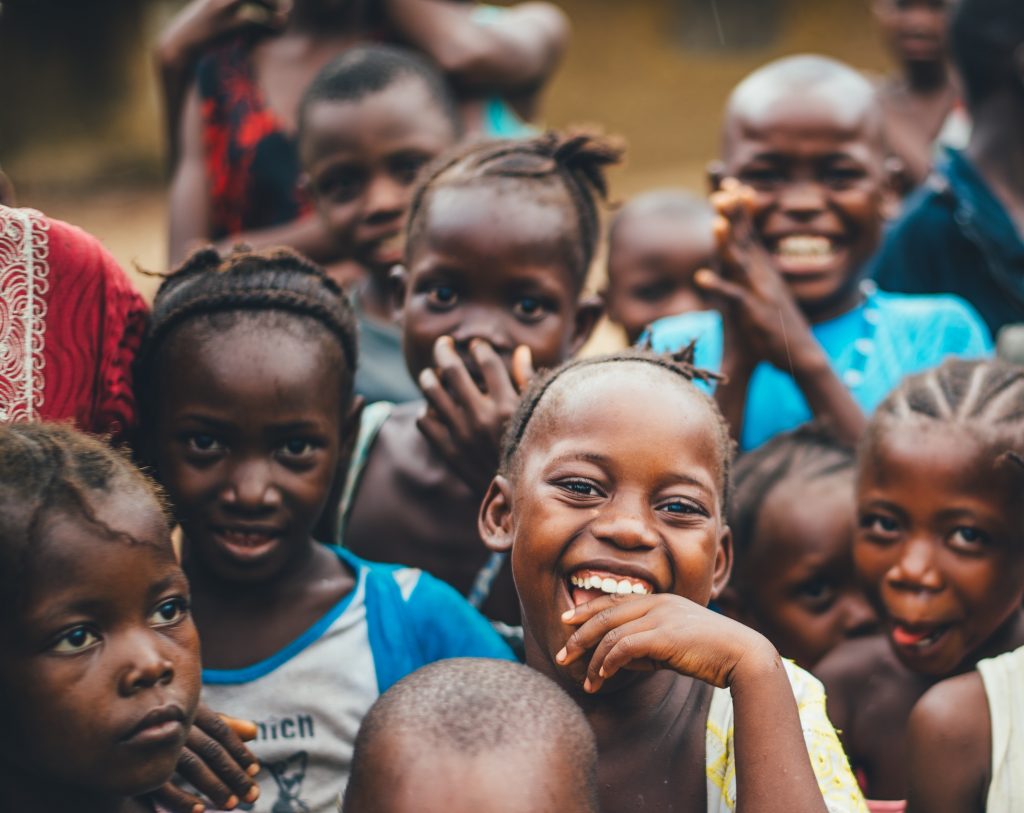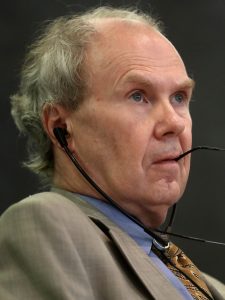Can AI and emerging tech boost African development?
This report recap is part of the AI & China: Smart Partnerships for Global Challenges project, focused on data and AI. The Atlantic Council GeoTech Center produces events, pioneers efforts, and promotes educational activities on the Future of Work, Data, Trust, Space, and Health to inform leaders across sectors. We do this by:
- Identifying public and private sector choices affecting the use of new technologies and data that explicitly benefit people, prosperity, and peace.
- Recommending positive paths forward to help markets and societies adapt in light of technology- and data-induced changes.
- Determining priorities for future investment and cooperation between public and private sector entities seeking to develop new technologies and data initiatives specifically for global benefit.
@acgeotech: Championing positive paths forward that nations, economies, and societies can pursue to ensure new technologies and data empower people, prosperity, and peace.
Summary of the Africa Roundtable on Technology for Good – June 4, 2020
About one year ago, the Atlantic Council received a Rockefeller Foundation grant that helped lay the groundwork for the new GeoTech Center. In order to analyze the way AI is changing societies, evaluate China’s role as a global citizen, and look at the ability of middle- and low-income countries to leverage technology for good, we started the Smart Partnerships for Global Challenges Series. Before COVID-19 stopped international travel almost completely, this endeavor brought us to Europe for roundtables in Paris, Brussels, and Berlin. In January 2020, an Atlantic Council delegation furthermore visited Beijing and Shanghai to engage with Chinese counterparts. Subsequent trips to India and Rwanda were scheduled for the spring of this year, but discussions had to be moved online for obvious reasons. Once adopted to the new normal and after successful conversations with our Indian counterparts on the challenges, opportunities, and geopolitics of AI, the final roundtable focused on the African continent and how emerging technologies can be harnessed there for good.
Experts from diverse backgrounds joined the digital discussion to address the following questions. 1) How will data collection and AI impact African societies and economies, and what are the pros and cons of using emerging technologies to spur development? 2) What is the role of big data and AI in fighting the novel coronavirus, and how can modern technologies support the post-COVID-19 economic recovery in Africa? 3) What are Africa’s strengths and weaknesses in data and AI development, and how can modern technologies be deployed there for social good? 4) How are external actors perceived in the field? As usual, the meeting was held under strict Chatham House Rules and the following summary features quotes and key ideas without attribution.

Most participants saw Africa as a blank slate for innovation, meaning that AI applications are not yet constrained by extant legal systems. “The continent has the advantage of just letting innovators do what they need to do before regulators adapt and get on board.” Of course, these circumstances are a double-edged sword, as others were quick to mention. “Africa does indeed provide a really good testing bed for AI applications, but this is exactly the reason why governments need to be careful. If there’s no framework, no digital infrastructure, no laws and regulations, it’s like an open playing field without security measures and consumer protection.” Another expert went one step further and warned of potential bad investors bringing dangerous technologies into the African market. “By the time governments catch on, it might be too late. Ultimately, there’s a need for strengthened, more robust legal systems, and until these get set up, consumers are at risk of abuse.” The expert continued by encouraging knowledgeable technologists to speak truth to power, to be a voice for people who don’t have many insights into the subject matter, and to educate them. Following that strain of thought, another speaker added that, regarding policies and regulations, the private sector is already light years ahead of the public sector anyway, which creates very different playing fields. “It’s not a question of if AI is coming, but when it is going to transform societies significantly. Be it increasing automation or new privacy concerns, governments really need to fully understand the extent of the changes, so that they can act, counter, and mitigate negative externalities.”
One attendee explained that, from a policy and legal perspective, “there is, on the one hand, euphoria about the potential that comes with modern technologies, but, on the other hand, also a lot of uncertainty over how to regulate the sector. After all, that unease delays policy and legal frameworks significantly, which in turn hampers innovators looking for registration, protection, and boundaries.” The speaker continued by emphasizing the need for reasonable agenda-setting, which could address government hesitancy when it comes to AI regulations. Modern technologies in general are emerging into a difficult environment on the continent that includes a degree of reluctance among the public. “Across the continent, people of color have had a difficult relationship with technologies, as applications often work against them. Moving forward, the development of trust is key, and technologies need to be human-centric, meaning people should have a say over what’s happening with their data. To put it bluntly, AI applications are nothing more than algorithms based on a lot of assumptions, which highlights the need for trusted data acquisition.” Achieving such an endeavor seems difficult given existing challenges. One participant mentioned that, with little reliable internet and power, sufficient data collection is almost impossible. “You end up having to deploy agents across all levels to do the groundwork, leading to formatting and uniformity issues, which can take a lot of time resolving. Sometimes, we spend days and weeks to just normalize datasets.”

The Lack of Data
Another issue brought up during the discussion was the lack of large-scale data collection by governments themselves, imposing a large burden on private companies, “which are no longer willing to share data, given the investments involved.” Subsequently, essential information are kept from subject matter experts who could benefit from having access to them. The systematic challenge is further complicated by individual hesitance to share private data. “Unfortunately, there is an unwillingness to share information on a personal level because of fears of what can be done with it. We often experience extreme consumer caution and lots of distrust. At times, people even refuse to share data or deliberately provide false info,” one participant explained.
The significant lack of data causes hardship for software developers. “As a continent, we have to do the necessary groundwork, given the increasing need for African data to manage and solve African problems. Substitutes with US or other foreign data are no longer sufficient, if we want local AI applications to work properly.” According to speakers, an additional obstacle is the politicization of data and AI, which has increased over the years. “Gathering information and collecting data always happen in a context, which makes things difficult, particularly if they occur in an authoritative regime. Can factors like location and proximity, for instance, indicate political leanings,” one participant asked. Experts further highlighted the fact that there is a fear, particularly in authoritative governments, that tech enables opposition forces, describing it as “a situation that often leads to excessive regulation and the elimination of social media platforms — measures that ultimately hamper the drive for technological innovation.”
When asked about China and the geopolitical aspects of technologies, participants gave responses very similar to those heard in Europe and India. Participants didn’t see it as an either-or decision and emphasized that most African states do not want to choose sides between the United States and China. “When it comes to AI applications, we intend to partner with the EU, the US, and China simply by collaborating with the most competitive companies of that respective country or region,” one speaker summarized. Others agreed, though highlighted that, because Western countries often limit the export of cryptographic tools, it is fairly easy for China “to export authoritarian technologies,” reinforcing the growing politicization of emerging tech. Interestingly though, Chinese startups are not yet ready to play a global role according to participants. “The PRC’s engagement in Africa mostly relies on a few big state-run companies.”
AI in Times of COVID-19
As in other regions, the ongoing pandemic has exposed gaps in Africa’s healthcare system, but it also provides an opportunity to use emerging technologies to fight the virus. “It is clear that the potential for devastation is enormous, but modern technologies can help authorities to slow the spread.” Interestingly, the slate is not as blank in the AI-health arena as it is in other sectors in Africa, one expert mentioned. “The health sector is highly regulated, limiting what can be done at the moment. We’ve been working with ministries to get around those regulations, though it remains a challenge.” One example of a tech-solution would be the automation of health processes to limit exposure risks for vulnerable groups. “We are able to automate prescription refills, but current regulations require in person collections as well as the involvement of a doctor,” one participant stated. Others agreed and emphasized that old regulations combined with the pandemic’s new circumstances, such as the need for self-isolation and social distancing, can often undermine technological advances as well as necessary data collection.
In order to gather needed information, participants reported interesting workarounds for technologists and medical experts. “We know that around 30% of pneumonia patients generally go to primary healthcare facilities or the local clinic. We also know that the coronavirus normally comes with some kind of pneumonia symptoms, which can help us getting a better idea of numbers and locations of cases.” Many of those measures, of course, raise privacy concerns, which is why foreign companies required to comply with European GDPR regulations at home also enforce the right to be forgotten in Africa. “Yet, ministries say that they own the data, too, because of existing partnerships, which puts many companies in an uncomfortable position.” It is here that individual freedoms are at odds with measures perceived to be in the public’s best interest.

Capacity Building Through Smart Partnerships
Irrespective of the novel coronavirus, participants agreed that capacity building will be absolutely essential for the development of modern technologies and their potential application to developmental challenges. “As a continent, we need to invest much more and educate tech practitioners for the dynamic environment. There’s not yet a body or framework at the pan-African level to address economic or digital infrastructures. Using a unified body to look at talent, investments, and necessary security precautions, however, is key.” According to participants, much of that work is still in the developmental phase, as it has only been two or three years at best since real machine learning systems were deployed in Africa. “We’re still often at the buzzword level because everyone is at a very early stage, maybe with the exception of Amazon and some other unicorns.”
However, experts were confident that Africa is well-positioned to take advantage of lessons learned from other countries and can leverage its strengths. “Given our young population, we have the chance to jump [ahead], skip many trial-and-error phases, and use technologies that are already known to work for social good.” Smart partnerships between governments and private sectors could play an essential role in that regard. “Scientists in the field of AI, for instance, use game theory models to help governments find contextual policies for dealing with emerging technologies.” Participants also reported on attempts to localize or regionalize data collection. “At SMART Africa, an initiative from African heads of state and governments to accelerate sustainable socioeconomic development, we look at two options to tackle this challenge of collecting data. First, a clearly defined roadmap should be set up to arrive at a joint understanding of data as a public asset on a regional level, and second, guidelines and policies need to be developed to open up public data sets.” Others agreed on the vital need for African data ownership, which could be achieved by “share-alike” arrangements that require all actors to give back to society when using open data.
Some suggested a four-part framework to spur such development and support broad innovation, requiring governments, NGOs, and industry to: 1) Connect countries that have expressed a desire to advance the AI agenda; 2) Create an in-depth stakeholder relations map to engage and educate various players; 3) Reduce the anxieties of the “powers that be”, by persevering and demonstrating how AI solutions benefit both local communities and government agendas; 4) Attract potential donors and private sector investors looking for projects to fund and partners to work with.
Participants were proud to point to examples of modern technologies already working hand-in-hand with infrastructure and human capital investments. For instance the Rwandan government which works together with Zipline, a delivery company that specializes in providing access to vital medical supplies, to administer drug and blood testing through drones. Zindi, the first data science competition platform in Africa, offers opportunities to solve specific challenges identified by companies, civil society organizations, and governments, based on best practices. A company named Lydia further bridges the credit gap in many African markets by helping small businesses access credit within short periods of time, using trained algorithms instead of traditionally onerous financial screening. “Closing the gap between expectation and reality, of course, remains the biggest challenge,” but participating experts were hopeful that with the right incentives and government policies, African countries can be more than just a blank sheet for innovation, and potentially emerge as the next hub of economic and social development.
The digital meeting with Africa was part of the Atlantic Council’s ongoing endeavor to establish forums, enable discussions about opportunities and challenges of modern technologies, and evaluate their implications for society as well as international relations — efforts that are championed by the newly established GeoTech Center. Prior to its formation and to help lay the groundwork for the launch of the Center in March 2020, the Atlantic Council’s Foresight, Strategy, and Risks Initiative was awarded a Rockefeller Foundation grant to evaluate China’s role as a global citizen and the country’s use of AI as a development tool. The work that the grant commissioned the Atlantic Council to do focused on data and AI efforts by China around the world, included the publication of reports, and the organization of conferences in Europe, China, India, and Africa. At these gatherings, international participants evaluate how AI and the collection of data will influence their societies, and how countries can successfully collaborate on emerging technologies, while putting a special emphasis on the People’s Republic in an ever-changing world. Summaries of the roundtables in Paris, Brussels, Berlin, Beijing, Shanghai, and with India have been published already.

The GeoTech Center champions positive paths forward that societies can pursue to ensure new technologies and data empower people, prosperity, and peace.

